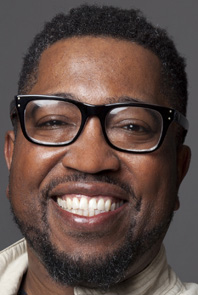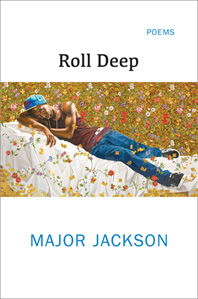
A CONVERSATION WITH MAJOR JACKSON
(A version of this interview appeared in the August 2015 issue of The Practicing Writer.)
I met Major Jackson when he was teaching in the MFA program I attended, and we’ve crossed paths a few times since then. I’ve followed his work with great interest, and when I saw that he had a new poetry collection forthcoming, I asked if I might interview him for this newsletter. He graciously assented.
Major Jackson is the author of four collections of poetry, most recently ROLL DEEP (Norton, 2015). He is the Richard A. Dennis Professor at the University of Vermont and a member of the core faculty at the Bennington Writing Seminars.
Please welcome Major Jackson!
ERIKA DREIFUS (ED): Last month, our guest writer (Leah Hughes) shared some lessons learned from her recent experience attending the Colrain Poetry Manuscript Conference. One of those lessons emphasized the importance of a collection’s title. Please tell us a bit about how you selected ROLL DEEP to title this collection.
MAJOR JACKSON (MJ): ROLL DEEP, like previous titles of my books of poetry, was born from intuition. Normally I reach for nuance, a phrase that offers multiple readings, but alludes to the essential ideas and questions that most resonant beneath the surface. Like a totem, the title is emblematic of what pervades and stretches from the first poem to the last page. When a reader closes a book after reading a poem or several and place the book down beside them or on a nightstand, they cannot help but return to the title. My great hope is that said reader realizes how the design is held together, how the collection unfolds and accretes, poem by poem, to a larger utterance.
In this collection, several poems are set in Philadelphia, my birth city and where I was reared. The city made me the artist I am today, of which I am eternally grateful. So I usually like to give a nod in my books to my urban roots in some shape or fashion. ROLL DEEP is taken straight from the parlance of hip-hop, in that it lets any person that might think of doing harm know that you are not alone; you belong to a strong community, a crew which is distinct from a gang. In thinking about my poems, I gravitated towards ROLL DEEP because it not only signaled the above, the continuum of consciousness, the influences that have helped shaped my thinking around art and love, its opposites, or a philosophy of language, poetry itself, but also because it seemed to sum up the spirit of motion and travel that has led to an ever-widening Yeatsian gyre of consciousness. Over the past five years, as a result of a combination of business and leisure, I have traveled to six different countries. It is customary of me to read or reread the poets and writers, to visit the art museums and archaeological sites. In this way, I am deepening my connection to the peoples of the world.
ED: Readers of your earlier collections will recall earlier suites of poems collected under the “Urban Renewal” umbrella. Please situate the “Urban Renewal” poems that fill the second section of ROLL DEEP—how do they fit with your previous work, and how do they extend it?
MJ: As I have stated elsewhere, I had the vision of writing a long, autobiographical sequence book of poems, a portrait-of-the-artist-as-a-young-man kind of book. URBAN RENEWAL was supposed to be my debut, a bildungsroman. But such a book requires an extended period of writing, which my breakneck pace of a life to simply make a living to pay a mortgage and schooling for my children does not allow.
So, at some point, I decided to make a deposit on that promise to myself by writing in each book sections of that dream over the hopefully long career of my life as a poet. And thus, at the end of my journey on earth, it will simply read as a long portrait of the poet as an old man. As alluded to in response to the prior answer, gaining experience feeds my life. These new Urban Renewal [poems] document some of the questions of travel that arose around identity, marriage, war, and history.
ED: The collection concludes with a kind of personal ars poetica titled “Why I Write Poetry”. You are now most certainly an established poet–this is your fourth collection; you’ve won numerous awards; you’re a tenured professor who teaches both undergraduate and graduate-level poets. Had you attempted to write a poem like this one earlier? How did you know you were ready to articulate the sentiments expressed in this poem?
MJ: Funny enough, I had never formally attempted an ars poetica. Said most familiarly, I do believe every poem is its own declaration of aesthetics or rationale for existence. I wrote that poem as an exercise one morning explaining to myself my obsession with words, this need to inscribe and interpret the mysteries in sonorous lines.
Originally appearing in PLOUGHSHARES, the poem was republished in BEST AMERICAN POETRY, where I explained how writing poetry against my own disbelief affords me the amazing fortune of being connected to the great human chain of poets across the ages in other countries who have also sought “to break through the anonymity of existence, to join the stream of human expression, to stylize a self that feels authentic, and quite possibly, timeless.” That self that is constructed in the mirror of all the poems I have written to date is startlingly familiar but also foreign. Writing “Why I Write Poetry” was a way of seeing him even more acutely.
ED: What is your biggest hope for ROLL DEEP as it meets readers?
MJ: This may sound coy or me posturing innocently, but with its apparent opacity at one end and its openness of feeling at the other, poetry is the most adventurous and risky of all the literary genres; yet, too, poetry is also the most rewarding. I ultimately wish a reader simply experience ROLL DEEP with pleasure and not get all apoplectic if they feel themselves challenged in any way. Poetry is an art of surprises. If one is not surprised, then it need not wear a reader down psychologically. They’ll just need to put the book down until such time they read it again, and hopefully a poem will induce uncontrollable laughter or plunge them into a labyrinth of thinking that itself is its own reward.
ED: Anything else you’d like us to know? Or parting advice to share?
MJ: So much of art-making relies on patience, especially to see what one is really doing, but also to develop a new relationship to language and syntax, truly great markers of advanced writing, which will by necessity and initially strike a reader as strange. An authentic use of language creates a new democracy or a new age. This is what I am advocating for these days.
Please visit http://books.wwnorton.com/books/Roll-Deep/ to discover more about Major Jackson’s new collection. I thank Major and his publisher for a complimentary advance reading copy.